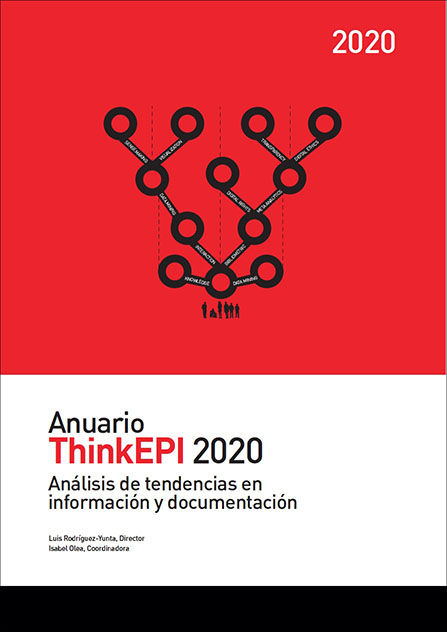Elaboración de productos de información con JAMstack: del sistema de gestión de contenidos al web estático
DOI:
https://doi.org/10.3145/thinkepi.2020.e14f05Palabras clave:
JAMstacks, Gestión de contenidos, Headless CMS, Generadores de web estático.Resumen
La evolución de los sistemas de gestión de contenidos ha propiciado la aparición de nuevas arquitecturas técnicas. Entre los desarrollos más novedosos destaca la aparición y consolidación de los generadores de web estático, y su integración en entornos de programación de aplicaciones web gracias a las JAMstack, pilas formadas por JavaScript, API y markups (markup languages, o lenguajes de marcado).
Citas
Altexsoft (2019). "What is API: Definition, Types, Specifications, Documentation". Altexsoft, 18 junio. https://www.altexsoft.com/blog/engineering/what-is-api-definition-types-specifications-documentation
Ayodeji, Bolaji (2019). "An introduction to the JAMstack: the architecture of the modern web". freeCodeCamp, 17 mayo. https://www.freecodecamp.org/news/an-introduction-to-the-jamstack-the-architecture-of-the-modern-web-c4a0d128d9ca
Barker, Deanne (2015). Web content management: Systems, features, and best practices. Sebastopol, CA: O´Reilly. ISBN: 978 1491908129
Billman, Mathias; Hawksworth, Phil (2019). Modern web development on the JAMstack: modern techniques for ultra fast sites and web applications. Sebastopol, CA: O´Reilly Media. ISBN: 978 1 492 05854 0 https://www.netlify.com/pdf/oreilly-modern-web-development-on-the-jamstack.pdf
Bradley, Jonathan (2020). "How to use an API management platform to easily build local web Apps". The Code4Lib journal, n. 48. https://journal.code4lib.org/articles/15190
Candem, Raymond; Rinaldi, Brian (2017). Working with static sites. Bringing the power of simplicity to modern sites. Sebastopol, CA: O´Reilly Media. ISBN: 978 1491960943
Cuesta, Jesús (2019). "Evolución del CMS a CMS headless u otras opciones". OpenExpo Europe, 15 marzo. https://openexpoeurope.com/es/evolucion-del-cms-a-cms-headless-u-otras-opciones
Diaz, Chris (2018). "Using static site generators for scholarly publications and open educational resources". The Code4Lib journal, n. 42. https://journal.code4lib.org/articles/13861
Dionne, Mathieu (2020). "New to JAMstack? Everything you need to know to get started". Snipcart, 16 enero. https://snipcart.com/blog/jamstack
Eíto-Brun, Ricardo (2013). Gestión de contenidos. Barcelona: Editorial UOC. ISBN: 978 8490297834
Engwall, Keith; Roe, Mitchell (2020). "Git and GitLab in library website change management workflows". The Code4Lib journal, n. 48. https://journal.code4lib.org/articles/15250
Halvorson, Kristina; Rach, Melisa (2012). Content strategy for the Web. New Riders, 2ed. ISBN: 978 0321808301
Heslop, Brent (2018). "History of content management systems and rise of headless CMS". ContentStack, 18 diciembre. https://www.contentstack.com/blog/all-about-headless/content-management-systems-history-and-headless-cms
Ismail, Kaya (2020). "34 headless CMS that should be on your radar". CMS Wire, 29 marzo. https://www.cmswire.com/web-cms/13-headless-cmss-to-put-on-your-radar
Kothari, Abhishek (2020). "11 headless CMS to consider for modern application". Geekflare, 15 abril. https://geekflare.com/headless-cms
Mayekar, Deepali (2017). Decoupling Drupal. A decoupled design approach for web applications. Berkeley, CA: Apress. ISBN: 978 1 4842 3321 4 https://doi.org/10.1007/978-1-4842-3321-4
Meghan, Casey (2015). The content strategy toolkit: Methods, guidelines, and templates for getting content right. New Riders. ISBN: 978 0134105109
Melgar, Julen (2019). "Creación de un API REST en Drupal e integración con Angular/IONIC". Blog.Crecemos.Contigo, Hiberus Tecnología, 19 noviembre. https://www.hiberus.com/crecemos-contigo/creacion-de-un-api-rest-en-drupal-e-integracion-con-angular-ionic
Newson, Kaitlin (2017). "Tools and workflows for collaborating on static website projects". The Code4Lib Journal, n. 38. https://journal.code4lib.org/articles/12779
Northwood, Chris (2019). The full stack developer: Your essential guide to the everyday skills expected of a modern full stack web eeveloper. Berkeley, CA: Apress. ISBN: 978 1 4842 4152 3 https://doi.org/10.1007/978-1-4842-4152-3
Ottervig, Vegard (2020). "Hybrid or headless CMS - what to choose?". Enonic, 10 febrero. https://enonic.com/blog/hybrid-or-headless-where-to-go
Pérez-Montoro, Mario (2008). Gestión del conocimiento en las organizaciones: fundamentos, metodología y praxis. Gijón: Trea. ISBN: 978 84 9704 376 2 https://bit.ly/3gxqHZA
So, Preston (2018). Decoupled Drupal in practice. Architect and implement decoupled Drupal architectures across the stack. Berkeley, CA: Apress. ISBN: 978 1 4842 4072 4 https://doi.org/10.1007/978-1-4842-4072-4
Tellado, Fernando (2019). "¿Qué es eso de "˜Headless WordPress´ o "˜Headless CMS´ y para qué sirve?". Ayuda WordPress, 30 abril. https://ayudawp.com/headless-wordpress-cms
Tramullas, Jesús (2015). "Gestión de contenidos, 2005-2015: una revisión". Hipertext.net, n. 13. https://raco.cat/index.php/Hipertext/article/view/294025
Tramullas, Jesús (2019). "Desarrollos en elaboración de documentación técnica: lenguajes de marcado ligero". Anuario ThinkEPI, v. 13, e13f03. https://doi.org/10.3145/thinkepi.2019.e13f03
Tramullas, Jesús; Garrido-Picazo, Piedad (coords.) (2006a). Software libre para servicios de información digital. Madrid: Pearson Prentice Hall. ISBN: 978 84 8322 299 7 http://pdfhumanidades.com/sites/default/files/apuntes/softlibrepservdeinfdig.pdf
Tramullas, Jesús; Garrido-Picazo, Piedad (2006b). "Los sistemas de gestión de contenidos". En: Tramullas, Jesús (coord.). Tendencias en documentación digital. Gijón: Trea, pp. 135-161. ISBN: 84 9704 270 0
Winkels, Niklas (2019). "The definitive guide to CMS architecture". BloomReach. https://developers.bloomreach.com/blog/2019/cms-architecture.html


